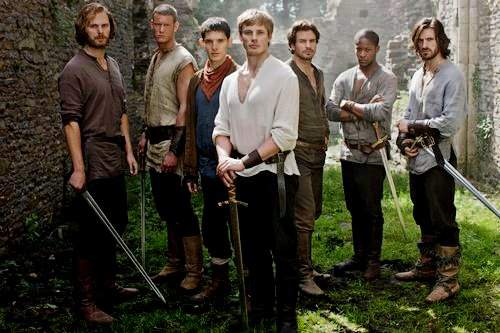The first two episodes of the new Merlin season are out, and the double-episode story seems to be the best Merlin tale yet.
When we last saw Merlin and his friends, they had just rescued the kingdom from dire a dire attack by the Immortal forces under Morgause’s control, and Uther had slipped into a sort-of madness from the betrayal of his daughter.
The season ended beautifully, having been well written, and finely developed throughout. I particularly enjoyed the slow subplot surrounding Morgana and Morgause, and their relationship as it developed of the course of the thirteen episodes. Actually, that character has been dynamically interesting over the course of the entire series so far, having been given just the right speed of progression, and caution.

Of course, we knew from the start that Morgana had to be a major villain for the full series arc, which just makes it that much more impressive that they managed to resist the urge to send her full evil right away.
Now that the fourth season is in full swing, we are seeing her in evil make-up, as it were, but it’s hard to forget that she was such a nice girl for so long. It makes for a very sympathetic villain, which is rare in television, and especially in fantasy television.
In the fourth season, Arthur and Merlin finally seem to be friends, and with Uther incapacitated, Arthur is beginning to let himself make his own calls around the kingdom, and his life, including his relationship with Gwen, a relationship which has seen far too little development.
In the double-episode season premier, Arthur and Merlin have to find a way to close the tear into the afterlife, which Morgana sacrificed Morgause to open, another interesting change to the cast, though not the last. The visual effects are the best they ever have been, and it’s clear that they’ve been given a greater budget, which opens them up to tell more interesting fantasy stories. Hopefully this will lead to a higher ratio of fighting fantasy monsters over character drama.
Nearly all of the monsters of the first two season relied on costuming. It was like watching Star Trek, where all the aliens just have odd foreheads. It was near the end of season three that the show ranched out a bit more in effects, and I think it proved effective.
One of the most interesting changes to the show for this season is the permanent loss of Lancelot. I was honestly expecting him to become part of some serious character drama later in the series, perhaps not waiting all the way until after Arthur’s marriage to Gwen, but at least until after they publicly declare their love for each other or something, but I guess the writers feel that they have already explored Gwen’s emotions on the topic clearly enough, and further drama would be wasted.
Of course, the show will always carry a huge amount of plot blindness; I mean Arthur has to be as unobservant as Lois Lane to not have picked up on Merlin’s secret powers by now. It will also always be a bit slapschticky, as its roots lay there. It’s a comedic Fantasy, but is learning to take itself seriously when needed. The episodes will likely lighten up a bit as the season progresses, but we’ve now seen that it can go to all the emotional spaces it needs to tell an effective story.
When Camelot, premiered earlier this year, I called it Merlin’s older brother, seeing it as a sort of grown up version of this smaller show, but Merlin has grown up a bit on its own now, and fully deserves our attention. The show can be found on BBC One and Syfy.






